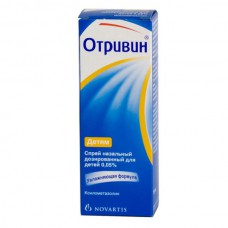Expiration date: 12/2026
Release form and composition:
Metered-dose nasal spray (menthol and eucalyptus) 0.1% as a white opalescent liquid with a smell of menthol and eucalyptus
1 ml contains Xylometazoline hydrochloride 0.5 or 1 mg
Excipients: sodium dihydrogen phosphate dihydrate, sodium hydrogen phosphate, dodecahydrate, sodium chloride, benzalkonium chloride (50% solution), sorbitol 70%, disodium edetate, levomenthol (menthol), cineol (evkaliptola), macrogol glycerylmonostearate, purified water.
10 ml - polyethylene bottles with a dosing device (1) supplied with tip and protective cap - packs of cardboard.
Pharmacological action:
Vasoconstrictor drugs for local application in ENT practice. Xylometazoline has alpha-adrenomimetic action. Causes constriction of the blood vessels of the nasal mucosa, thereby eliminating edema and hyperemia of the mucous membrane of the nasopharynx. Facilitates nasal breathing in rhinitis.
Contained in the preparation is menthol, and eucalyptus have a cooling effect on the mucous membrane of the nose.
The drug is well tolerated by patients with sensitive mucous membrane, its effect does not preclude the mucus. The drug has a balanced pH, characteristic of the nasal cavity.
In therapeutic concentrations does not irritate, does not cause hyperemia.
The action comes a few minutes after application and lasts for 12 hours.
Pharmacokinetics:
The local application is practically not absorbed, plasma concentrations are so small that they are impossible to define modern analytical methods.
Indications:
- acute respiratory illness with symptoms of rhinitis
- acute allergic rhinitis
- pollinosis
- sinusitis
- Eustachian
- otitis media (to reduce swelling of the mucous membrane of the nasopharynx)
- preparation of the patient for diagnostic procedures in the nasal passages.
Dosing regimen:
Adults and children over 6 years - 1 injection into each nostril (if necessary, you can reapply), usually 3-4 injections a day.
Duration of use not more than 10 consecutive days.
Side effects:
Local reactions: with frequent and/or long – term use- irritation and/or dryness of the mucous membrane of the nasopharynx, burning sensation, tingling, sneeze, hypersecretion rarely – edema of the nasal mucosa.
Systemic reactions: with frequent and/or long – term use- nausea, rarely – tachycardia, palpitations, arrhythmia, increased blood pressure, headache, dizziness, vomiting, insomnia, blurred vision, allergic reactions, prolonged use of the drug in high doses - depression.
Contraindications:
— arterial hypertension
— tachycardia
— severe atherosclerosis
— glaucoma
— atrophic rhinitis
— hyperthyroidism
— surgical interventions on the brain casings (in history)
— children up to age 6 years
— hypersensitivity to the drug.
Be used with caution in patients with diabetes, cardiovascular disease, and increased sensitivity to adrenergic drugs, accompanied by symptoms of sleeplessness, dizziness, cardiac arrhythmia, tremors, high blood pressure.
Pregnancy and lactation:
During pregnancy and lactation the drug should be used only after careful evaluation of the balance of risks and benefits for mother and fetus, it is not allowed to exceed the recommended doses.
Special instructions:
Do not exceed recommended dose and duration of use of the drug, especially in children and elderly patients.
Effects on ability to drive vehicles and management mechanisms
Xylometazoline does not affect the ability to drive vehicles and management mechanisms.
Overdose:
Symptoms: increased side effective (increased blood pressure, increased heart rate, and sometimes confusion).
Treatment: symptomatic therapy.
Drug interactions:
Incompatible with MAO inhibitors and tricyclic antidepressants.
Terms and conditions of storage:
The drug should be stored out of reach of children at temperature not exceeding 25°C. shelf Life – 2.5 years.




